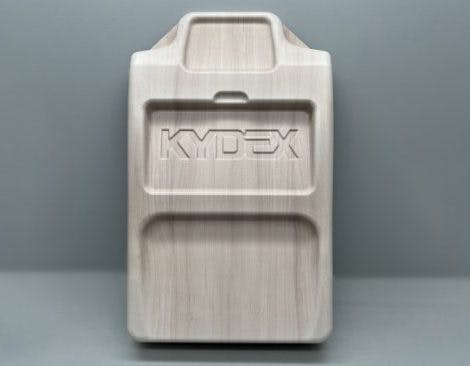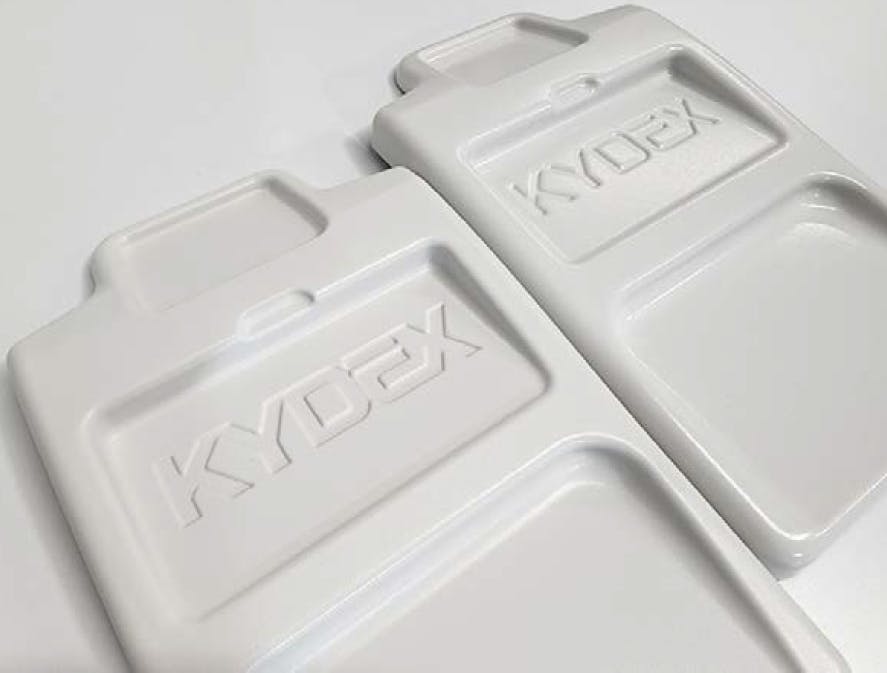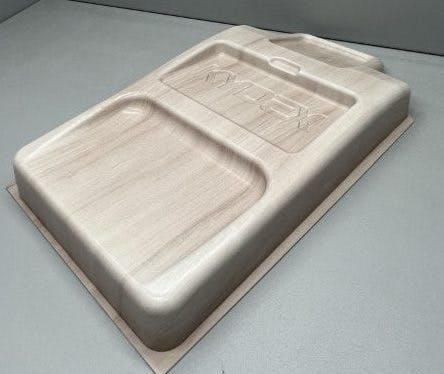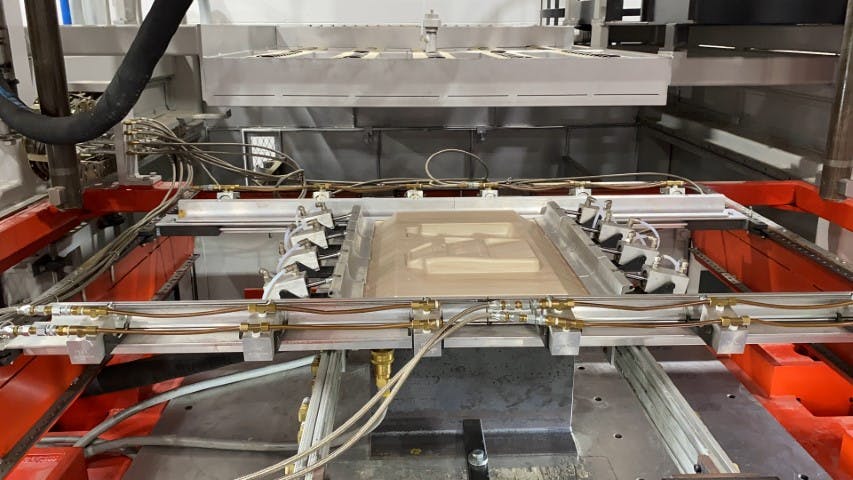
The rolling stock industry is growing worldwide due to sustainability concerns. Beyond being a viable alternative to automotive and aviation travel, depending upon stage length, the rail industry is poised to become more sustainable through the material selection process. As a replacement to fiberglass reinforced plastic (FRP), thermoplastics can transform rail car interiors to be more lightweight and durable, with added design forward options to improve the passenger experience.
The mass transit interiors team at SEKISUI KYDEX set out to showcase how thermoplastics can provide better aesthetics, enhanced durability, and improved sustainability for rolling stock interiors. To do this, the designLab®, appLab™, and business development teams collaborated to create a pressure formed sample using polyvinylidene difluoride (PVDF) capped KYDEX® 2200LT rail material with Infused Imaging™. The goal was to develop a part to debut in September 2022 at InnoTrans, the world’s largest trade fair focused on the rail transport industry. Meeting this deadline required a quick turnaround by rapidly prototyping the parts.
PART DEVELOPMENT
In June of 2022, SEKISUI KYDEX welcomed their summer appLab™ interns from the Pennsylvania College of Technology, Plastics and Polymers program. Students primarily focused on creating and designing parts. The mass transit prototype project offered an opportunity to educate the interns on the rapid prototyping process, while creating an educational tool for customers to illustrate different thermoforming processes within one part.
To kick off the project, a competition was held among the interns to design and present mass transit inspired parts for consideration. They were tasked with developing a part that included both a positive and negative mold shape in one tool, allowing dual use of the part by simply flipping the sheet in the thermoforming process. When thermoforming within the positive side of the mold, the corners are more rounded, and when pressure forming the negative side you can achieve crisp edges.
“Our internships give students the opportunity to work on real projects as part of the learning process. This project is an excellent way for our interns to get hands on experience in the field in which they are interested, while providing an educational tool for use with customers. The final part serves as an example of how KYDEX® Thermoplastics perform in different thermoforming processes,” said Shawn Gum, Business Development Engineer.
Elijah Peltz’s concept for a mini seatback design with the KYDEX® Thermoplastics logo was ultimately chosen. He spent July 2022 refining the design and programming the tool path on the CNC machine. During his experienceship, Peltz learned to program design for both RenShape® and aluminum tools. Ideally the final tool would be made from aluminum because the molds are temperature controlled and provide better consistency from part to part. They are also more durable and can be used for thousands of parts. RenShape® is an inexpensive polyurethane modeling and styling board that can be quickly and easily CNC routed into specific shapes but is not temperature controlled. Although the temperature of the RenShape® mold can fluctuate over time and the part dimensions can vary from part to part, it is ideal for rapid prototyping.
Originally Peltz planned to create the first tool using RenShape® because of how quickly it can be developed, but machine time was limited due to other appLab™ projects. Peltz then focused on developing an aluminum tool and learning how to run the machine efficiently. In collaboration with Collin Everett, appLab™ Specialist, who has a background in machining, they implemented faster feeds and speeds to expedite the rapid prototyping and learning process. Peltz’s internship ended in early August 2022 with a nearly complete aluminum tool.
“The seatback project was a fun challenge because I had never machined something that complicated. It’s still hard to believe I executed a detailed project on a machine I had just learned how to use. I was impressed by the results for my first try despite it still needing some cleanup work,” said Peltz.
To ensure first round parts for the InnoTrans Summit in September, Shawn Gum, Business Development Engineer, stepped in to expedite a positive RenShape® tool with an in-house trim fixture in less than two days. The parts pulled from this round were not as crisp as the final but were excellent talking pieces for the InnoTrans Summit.
“Several seat manufacturers I visited at InnoTrans were impressed with the design capabilities of the thermoformed mini seatback. They were particularly interested in the patterned samples as great alternatives to laminates. They also provided us with some pattern direction which we were able to implement in our next round of samples,” said Ruben Bake, Mass Transit Business Manager.
With the first parts out the door, Everett stepped in to finalize the aluminum tool in less than two months. He machined air pockets and drilled holes on the back side of the tool to ensure consistent thickness from the textured surface of the tool to easily drill the vacuum holes, then sanded and polished the surfaces. Mounting holes were added to allow the final tool to be bolted to a universal temperature-controlled plate, which makes switching out tools on the thermoformer more efficient. Once the tool was ready, the appLab™ team sent it to Custom Etch to add a light sand finish surface texture, which was completed in less than one week. This texture is similar to KYDEX® Thermoplastic’s standard P3 texture, but slightly deeper so when pressure formed it mirrors how P3 texture looks on flat sheet.
With the finalized tool back in hand, the appLab™ and maintenance teams drilled in vacuum forming holes and constructed the pressure box for the thermoformer. The team then pressure formed a full set of positive and negative parts using the textured tool in time for the RedCabin Railway Interiors Innovation Summit on November 15, 2022.

MATERIAL PROCESSING CONDITIONS
After pulling multiple parts and adjusting the MAAC thermoformer conditions, the appLab™ team found 390 degrees Fahrenheit with a bottom heat of 10% and top heat of 60% yielded the ideal draw results.

MATERIAL DESIGN

While the appLab™ team was working on tool design, the designLab® team was developing patterns and selecting colours for the final parts. Their goal was to showcase the benefits of integral colour and Infused Imaging™ technology utilizing PVDF capped materials, compared to metal or fiberglass that is traditionally painted.
“One of the greatest benefits of using Infused Imaging™ on capped KYDEX® Thermoplastics is that customers can create custom panels with orders as low as one sheet. Traditionally, capped materials with a pattern require purchasing an entire roll of patterned film,” said Karyn McAlphin, Creative Design Lead. She continued, “If you’re already placing an order for a specific-coloured substrate – pale grey or beige for example – you can easily develop a complementary pattern that can be infused onto just a sheet or two for those special areas in your interior.”
Infused Imaging™ technology embeds the pattern into the sheet, rather than on it, allowing custom quantities and increased quality. Importantly, it won’t chip, fade, or delaminate like other materials, and because the design permeates the capped material, it retains the anti-graffiti and cleanability properties of the PVDF film.
For the first round of parts, Becky Gallup, Senior CMF Design Artist, and McAlphin discussed using a tiny, tight geometric design from the 2022 Infused Imaging™ collection. Their objective was to illustrate how a pattern could be used to create the illusion of solid-coloured seats throughout an entire train car yet provide greater visual interest up close to enhance the passenger experience.
To do this, Gallup recreated the Geo pattern to work with the part. By turning the pattern 45 degrees and adjusting the scale to complement part geometry, she was able to accommodate the alignment of the pattern into the KYDEX® logo that was formed in the part.
To ensure sustainable practices throughout the project, the team opted to utilize material running in an existing order of solid colour sheets of material with the PVDF film. Because the material was a bright warm cream colour with a yellow undertone, and the team wanted a more neutral design, Gallup used Photoshop overlays to adjust the pattern with colour variations and colour intensity across one image. The image was run through the Infused Imaging™ process and the team reviewed the colour, clarity, and intensity levels to select the right mix. “You need to find the sweet spot between colour and pattern so it’s not overwhelming. A colour that’s too intense can result in too much contrast and detract from the overall part design”. She continued, “On the other hand, a pattern that is too subtle can lose its visual intrigue on the final part.”
Gallup was able to reduce the warmth of the substrate and transform the pattern direction to complement the integral colour of the stock sheet as well as the geometries of the final part. “These subtle changes show how versatile Infused Imaging™ designs can be across multiple applications,” stated Gallup.
For the second round, McAlphin and Gallup selected a pale woodgrain pattern consistent with recent trends in railcar interiors to show how fluid patterns can seamlessly transition over part corners and draw depths. Gallup said, “The woodgrain has a natural wave in the pattern which we successfully integrated into the part when it was formed. With this more intricate design, we could capture pattern detail without overpowering the final part’s shape.”
The base colour for the woodgrain was a more subtle and cool beige compared to the first sample, and Gallup selected an Olive Ash design. She adjusted several darker areas of the woodgrain by modifying the grain colour directly and changing the placement of the grain to the part, to enhance the appearance of a modern wood design. She then also edited the scale of the woodgrain to match a full-size seat so customers would be able to visualize the pattern in a true to life application scale.
Utilizing rapid prototyping and industry leading design, the teams at SEKISUI KYDEX delivered on their mission to create a versatile and educational part for the Mass Transit Industry. The team is already back to work on the next round of pattern design iterations to showcase even greater possibilities.

